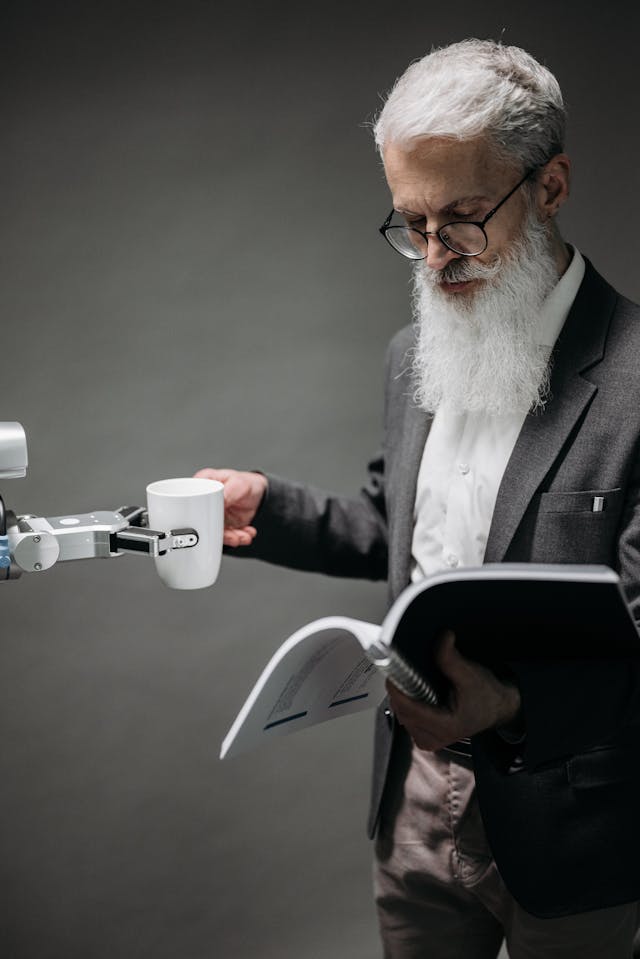Automation is rapidly transforming our world. From self-checkout kiosks at grocery stores to AI-powered chatbots in customer service, machines are taking on tasks once exclusively performed by humans. This trend has sparked a heated debate: is automation a job killer or a job creator? The answer, as with most things in life, is not so black and white.

The Automation Juggernaut: Potential Job Displacement
There is no denying that automation displaces some jobs. Repetitive, manual tasks are prime targets. Factory assembly lines, data entry positions, and even some aspects of transportation (think self-driving trucks) are all susceptible to automation.
This displacement can have a significant impact on individuals and communities. Workers in affected industries may face unemployment, retraining needs, and potential wage stagnation.
Beyond the Headlines: Automation’s Upsides
However, the narrative of automation as a solely destructive force is misleading. Here’s why:
- Increased Productivity and Efficiency: Automation can streamline processes, boost productivity, and lower costs. This economic growth can lead to increased demand for goods and services, ultimately creating new jobs in different sectors.
- Shifting Skillsets, Not Elimination: While some jobs may disappear, automation often creates new ones. These new jobs often require different skillsets, such as data analysis, programming, and the ability to manage and maintain complex machines.
- Enhanced Job Quality: Automation can take over the more mundane and potentially dangerous tasks, allowing human workers to focus on higher-level cognitive tasks that require creativity, problem-solving, and social skills.
The Human-Machine Collaboration Imperative
The future of work likely will not be a stark choice between humans and machines. Instead, we will likely see a rise in human-machine collaboration. Workers will leverage automation tools to augment their skills and perform their jobs more effectively.
This collaborative approach requires investment in education and training programs to equip the workforce with the skills needed to thrive in an automated future.
The Policy Landscape: Preparing for Change
Governments and policymakers have a crucial role to play in mitigating the negative impacts of automation while reaping its benefits. This may involve:
- Social safety nets: Programs like unemployment benefits and retraining initiatives can help workers who lose their jobs due to automation transition to new careers.
- Universal basic income (UBI): This controversial concept proposes providing all citizens with a basic income to ensure a minimum standard of living, regardless of employment status.
- Regulations for fair competition: Automation shouldn’t come at the expense of worker exploitation. Regulations may be needed to ensure fair wages, safe working conditions, and responsible use of automation in the workplace.
The Future of Work: Embracing the Change
Automation is an unstoppable force. The key is to prepare for it, not resist it. By investing in education, fostering human-machine collaboration, and implementing responsible policies, we can navigate the automation wave and create a future where technology empowers, not disenfranchises, the workforce.
Beyond the Blog: Taking Action
Here are some things you can do to prepare for the changing job landscape:
- Identify in-demand skills: Research the skills expected to be in high demand in the future and consider upskilling or reskilling if necessary.
- Embrace lifelong learning: The ability to adapt and learn new things will be crucial in a dynamic job market.
- Explore emerging technologies: Familiarize yourself with the latest automation trends and how they might impact your profession.
- Advocate for responsible automation: Support policies that promote fair treatment of workers in an automated future.
The impact of automation on jobs will be a complex and multifaceted story. By acknowledging both the challenges and opportunities, we can ensure that automation works for, not against, humanity. The future of work holds immense potential, and by embracing change and preparing for the unknown, we can write a positive chapter in this ongoing story.